Risk Management
Risk Management
Overview
In the regulated industry, risk management is critical to ensuring that manufactured products meet the highest standards of safety and quality. A robust risk management system prevents failures, improves operational efficiency and ensures compliance with rigid regulations, such as those required by ANVISA, FDA and EMA.
Importance of risk management
Risk management is an essential strategic tool to identify, evaluate and mitigate possible risks that can affect product quality and patient safety. The implementation of an effective system allows the pharmaceutical company to anticipate problems before they happen, avoiding rework, product recalls and financial losses.
Risk Management Benefits
- Loss Reduction: By mitigating the risks, companies reduce the chances of financial and operational losses.
- Quality improvement: The identification and elimination of process failures contribute to continuous improvement of product quality.
- Regulatory compliance: Risk management is a requirement of regulatory agencies and helps ensure that the company is always in accordance.
Main stages of risk management
Risk Identification: At this stage, all areas and processes where there are potential for problems that can compromise quality or safety are mapped.
Risk Assessment: After identifying the risks, the company evaluates them, determining the impact and probability of occurrence. This allows you to prioritize actions.
Controls and mitigating measures: Corrective and preventive actions are implemented to minimize or eliminate identified risks, ensuring the integrity of processes and products.
Continuous monitoring: Risk management is not a static process. It must be monitored and continually updated to reflect changes in processes or new regulations.
Why is T&B Pharma the ideal choice?
With a team of senior consultants, with international expertise and deep knowledge in the pharmaceutical, cosmetic and medical devices, T&B Pharma offers solutions that help your company stand out in the market. Our services include:
- Quality Management Consulting and Compliance
- GMP Training
- Quality Audits
- Implementation of total quality programs
Quality, safety and compliance in the regulated industry
Risk management is crucial for the success and longevity of regulated companies. By implementing effective risk management strategies, companies can optimize processes, ensure product quality and patient safety, and comply with international regulatory standards.

